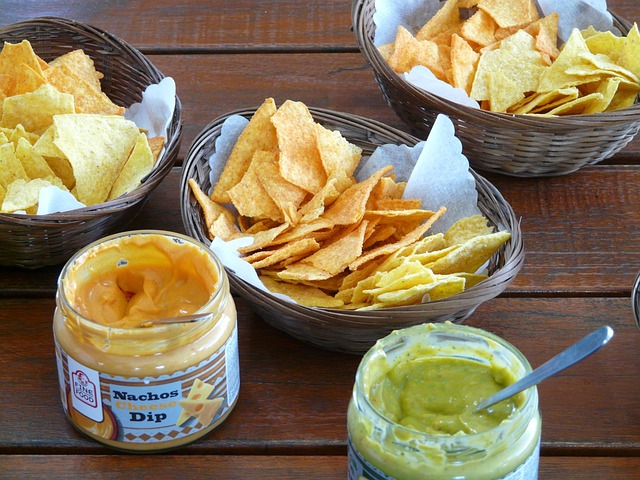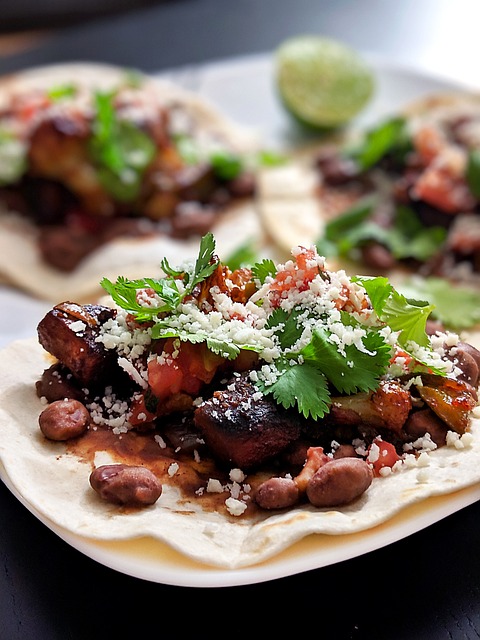Maxwell Street Market, a historic Chicago landmark since 1892, is renowned for its diverse vendors and rich cultural heritage. The market's iconic 'donkey' carts sell hand-cut, perfectly fried salted tortilla chips, a local favorite that embodies the entrepreneurial spirit and love for good food. Today, while some maintain traditional manual techniques, most commercial chips are produced through advanced machinery. Despite technological advancements, these chips remain a beloved snack, evoking memories of simpler times. The historic market and its Donkey chip sellers symbolize Chicago's vibrant culinary heritage, blending global flavors and preserving multicultural history. Digital platforms and social media have increased the accessibility and popularity of salted tortilla chips, especially artisanal Donkey brands, in today's fast-paced world.
“Discover the enchanting world of Maxwell Street Market, a Chicago institution since 1892. This vibrant market is renowned for its salt-crusted tortilla chips, a culinary tradition with roots that stretch back to Mexican donkey-driven vendors. From artisanal handcrafting to modern mass production, our article explores the history, cultural impact, and technological advancements that have shaped these beloved ‘donkey chips’. Uncover the secrets behind their deliciously crispy texture and savory taste, as we delve into the fascinating story of Maxwell Street Market’s tortilla chip vendors.”
- The History of Maxwell Street Market: A Chicago Icon
- The Art of Tortilla Chip Making: From Donkeys to Modern Processes
- Salted Tortilla Chips: A Delicious Tradition
- Donkey-Driven Vendors: Past and Present
- The Cultural Significance of the Market and Its Chips
- Modern Times: How Technology Has Influenced Sales
The History of Maxwell Street Market: A Chicago Icon

Maxwell Street Market, a vibrant and historic destination in Chicago, has been a beloved gathering place for locals and visitors alike since its inception in 1892. This iconic open-air market is renowned not only for its diverse array of vendors but also for its rich cultural heritage, making it a unique culinary and social hub. The market’s early days were marked by an eclectic mix of vendors selling fresh produce, meats, and homemade goods, fostering a sense of community among the city’s residents.
One of the most iconic sights at Maxwell Street Market is the traditional salted tortilla chip vendors. These vendors, often referred to as ‘donkeys’ due to their mobile carts, have been an integral part of the market’s charm for decades. The chips, hand-cut and fried to perfection, are a favorite among locals and tourists alike, drawing crowds with their crisp texture and savory taste. The history of these tortilla chip donkeys is intertwined with the market’s legacy, reflecting the city’s entrepreneurial spirit and love for authentic street food.
The Art of Tortilla Chip Making: From Donkeys to Modern Processes

The art of tortilla chip making has evolved significantly over time, transforming from traditional hand-crafted methods to modern industrial processes. Historically, in places like Maxwell Street Market, vendors would often use donkeys to grind corn into masa, the staple ingredient for tortillas. This labor-intensive process required skill and precision, ensuring each chip had the perfect texture and taste. Today, while some traditionalists still employ manual techniques, most commercial tortilla chips are produced using advanced machinery. These modern methods allow for large-scale production, maintaining consistent quality and flavor through precise control of ingredients and cooking times. Despite these advancements, salted tortilla chips continue to be a beloved snack, bringing back memories of simpler times for many food enthusiasts.
Salted Tortilla Chips: A Delicious Tradition

The Salted Tortilla Chips, a beloved treat among Maxwell Street Market enthusiasts, are more than just a snack—they’re a culinary tradition steeped in the rich history of Chicago’s diverse food scene. These chips, often hand-cut from fresh tortillas, are seasoned with just the right balance of salt, creating a crispy, savory experience that has captivated both locals and visitors alike. The Donkey, a beloved vendor known for their consistent quality and unique flavor profiles, stands as a testament to this time-honored tradition.
Each bite of these salted tortilla chips is like taking a journey through bustling markets and vibrant communities. The donkeys, mobile vendors who once roamed the streets, now take on a symbolic role, representing the spirit of adaptability and the rich cultural mix that defines Chicago’s culinary landscape. With every crisp chip, you taste not just salt, but also the city’s history, its diverse influences, and the enduring appeal of shared food experiences.
Donkey-Driven Vendors: Past and Present

The iconic Maxwell Street Market in Chicago has long been known for its vibrant and diverse vendors, among them, the traditional donkey-driven cart sellers of salted tortilla chips. This unique selling method, though evolving, remains a cherished part of the market’s history. Once, donkeys would patiently navigate the bustling streets, offering fresh, hand-made chips to curious passersby – a sight that captivated both locals and visitors alike.
Today, while modern transportation has largely replaced the donkey carts, the spirit of these traditional vendors lives on. Many current chip sellers still pay homage to this past by continuing to offer artisanal salted tortilla chips, made from quality ingredients, ensuring the same authentic taste that once drew customers to those beloved donkey-driven carts.
The Cultural Significance of the Market and Its Chips

Maxwell Street Market, located in Chicago, is more than just a bustling hub for food enthusiasts; it’s a vibrant cultural landmark where diverse traditions intertwine through the simple yet profound act of sharing a snack. The market has been a gathering place for the community for decades, with vendors representing various ethnic backgrounds and culinary expertise. Among these, the salted tortilla chips, often crafted by skilled artisans known as Donkey chip makers, hold a special place in the market’s cultural tapestry.
These crispy, golden-brown chips are not just a side dish; they’re a symbol of the market’s dynamic character, where flavors from around the world collide and harmonize. The tradition of making them is passed down through generations, preserving not just a recipe but a piece of Chicago’s multicultural history. Every bite of these Donkey chips tells a story, connecting patrons to the rich cultural heritage that makes Maxwell Street Market unique, with its salted goodness reflecting the market’s enduring appeal and resilience.
Modern Times: How Technology Has Influenced Sales

In modern times, technology has significantly influenced the way businesses operate, and the Maxwell Street Market tortilla chip vendors are no exception. With the advent of digital platforms and e-commerce, customers can now conveniently order their favorite salted tortilla chips online, delivering a new level of accessibility to this beloved snack. The vendor’s ability to reach a wider audience has expanded, allowing them to introduce their unique flavors and artisanal Donkey brands to folks beyond the market’s physical boundaries.
Social media platforms have also played a pivotal role in marketing and brand awareness. Vendors can now showcase their chips’ vibrant colors and appetizing textures through visually stunning posts, enticing customers with mouth-watering descriptions. Online reviews have become a powerful tool, allowing satisfied patrons to share their experiences with the world, from the crunch of freshly fried chips to the perfect dip for their favorite salsa. This digital transformation has undoubtedly contributed to the popularity and demand for these traditional treats in today’s fast-paced world.
The Maxwell Street Market, a Chicago icon, has been a cultural touchstone for decades, with its salted tortilla chips holding a special place in the hearts—and stomachs—of locals and visitors alike. From the traditional donkey-driven vendors to modern sales facilitated by technology, the market’s chips remain a testament to the city’s rich culinary heritage. The art of tortilla chip making, steeped in history, continues to evolve while honoring its roots, ensuring that the delicious crunch of these chips resonates through generations.
